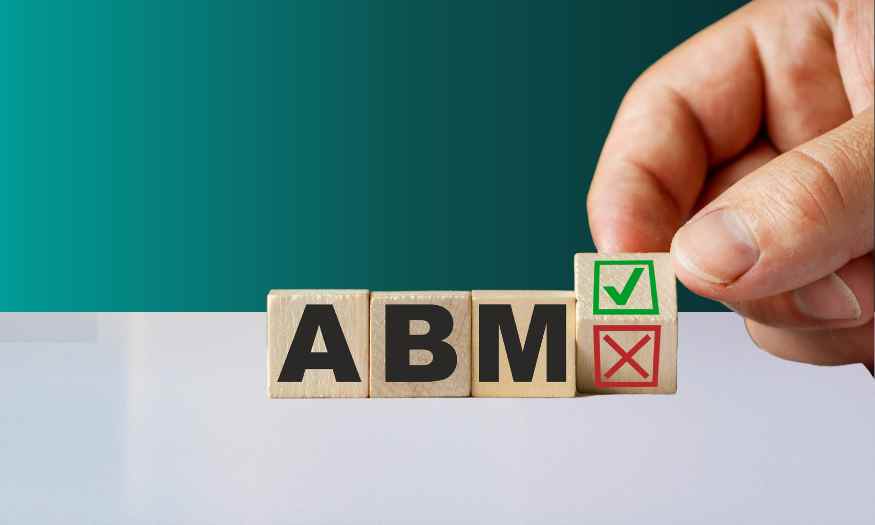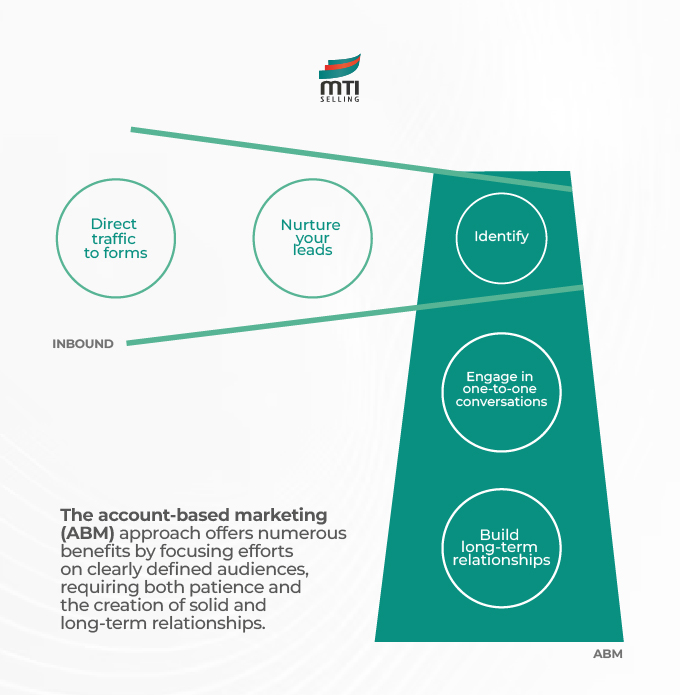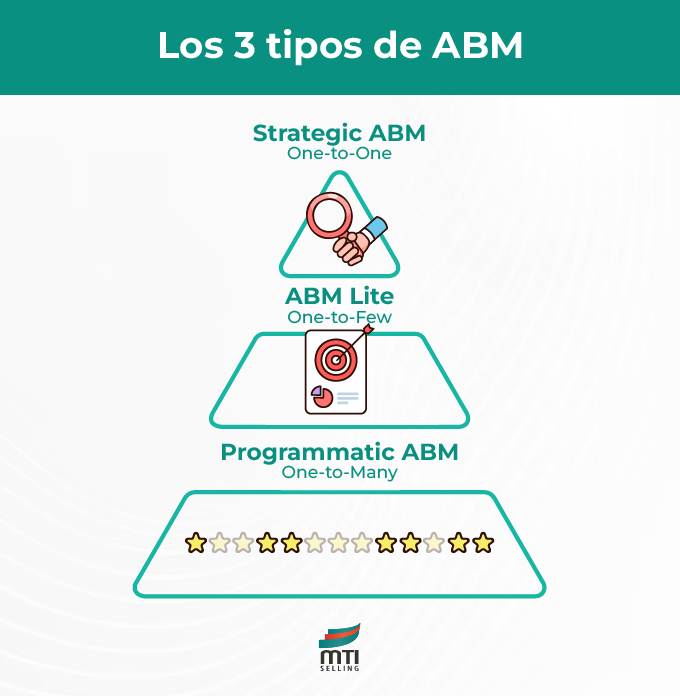Account-Based Marketing (ABM): a marketing strategy to conquer high-value accounts - Part I
MTI Selling

Surely this is not the first time you hear about this term. However, if it’s new for you, keep reading and find out how you can create personalized and long-term relationships with the account-based marketing (ABM) strategy.
For the last few months, we’ve been noticing that traditional marketing strategies allow for reaching a broad target market through mass advertising tactics, cold calling, networking and valuable content on digital channels, among others.
What is account-based marketing (ABM)?
Account-based marketing (ABM) is a B2B marketing strategy focused on a defined set of high-value target accounts. In a few words, rather than launching broad campaigns that aim at attracting a broad group of potential customers, ABM specifically targets predefined accounts.
Today, account-based marketing (ABM) has come to chart a new path, focusing on helping companies increase their ROI, generate more qualified leads, speed up the sales cycle and improve customer satisfaction, with a huge differential: focusing on small groups in order to reach high-value potential customers.
For 2024, expectations for account-based marketing are riding at an all-time high, and that is also reflected in a report shared by Sirious Decisions, which states that currently 50% of companies have their own pilot ABM programs and over 60% are expected to invest in ABM technology.
What are the benefits of implementing account-based marketing (ABM)?
If we talk about advantages, these are some that will surely catch your attention:
-
Generation of more qualified leads.
ABM allows you to identify and generate leads that are more likely to convert into customers.
-
Faster sales cycle.
ABM builds personalized relationships with target accounts, which facilitates communication and negotiation.
-
Improved customer satisfaction.
ABM is based on the creation of personalized experiences for each of your customers.
-
Marketing and sales alignment.
ABM promotes a close synergy between the marketing and the sales teams.
-
Increased efficiency in the resources used.
ABM enables companies to optimize their marketing resources to increase their revenue.
-
Valuable information obtained.
ABM enables companies to obtain valuable information about their potential customers and their behavior, allowing companies to tailor their strategies and achieve better results.
Types of account-based marketing (ABM)
There are mainly three types of account-based marketing strategies. These far-reaching strategies are essential to understand, from a quantity-based perspective, how we should approach our ABM marketing strategy.
This is how we implement ABM strategies in MTI Selling:
-
One-to-One or Strategic ABM:
Perfect for companies with sufficient resources and long sales cycles. Get ready for a higher investment, but also for a potentially huge ROI increase.
-
One-to-Few ABM or ABM Lite:
Well-suited for companies with moderate resources and intermediate sales cycles. It offers a good balance between scope and personalization.
-
One-to-Many or Programmatic ABM:
It’s ideal for companies with large budgets and short sales cycles. It’s an efficient approach to generate a higher number of qualified leads.
What kind of companies can use account-based marketing (ABM)?
Another key component of ABM is undoubtedly its versatility, which helps companies from different sectors to use ABM in order to reach their marketing and sales goals.
Important: Before implementing an ABM marketing strategy, it is crucial to assess your business and goals to determine its suitability.
Meanwhile, let us share with you some considerations based on our expertise and according to companies that:
1. Have a limited number of potential customers:
If you company has a limited number of potential customers, such as companies selling corporate software or specialized machinery, an ABM strategy enables you to focus on those who are more likely to become customers and increase your return on investment (ROI).
2. Have high-value products or services:
If your company offers high-value products or services, such as consulting or technology solutions, ABM allows you to create personalized relationships with your potential customers and increase the likelihood of closing deals.
3. Have long sales cycles:
If your company has long sales cycles, such as companies that sell SaaS solutions or industrial equipment, ABM allows you to nurture your leads throughout the buying process and increase the conversion rate.
4. Need to enter a new market:
If your company is looking to enter a new market, ABM allows you to identify key potential customers in that market and develop tailored marketing strategies for them.
5. Are interested in increasing customer retention:
If your company is looking to increase customer retention, ABM allows you to build stronger relationships with your existing customers and offer them customized solutions that meet their needs.
We know there is still a lot of work to be done… But don’t worry, we will be posting a second article about this topic with steps to successfully implement account-based marketing in your strategy and other interesting information.
Remember that if you want to start your marketing and sales strategy to reach specific and high-value accounts with the help of our team, contact us and let’s schedule an appointment!





